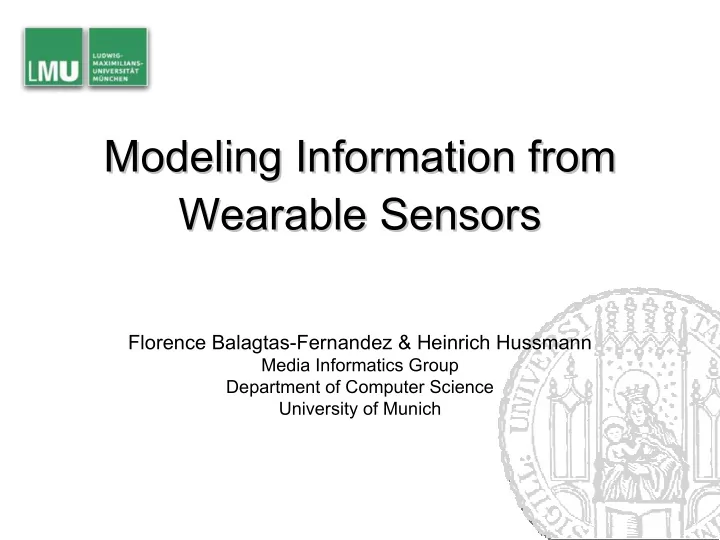

Modeling Information from Modeling Information from Wearable Sensors Wearable Sensors Florence Balagtas-Fernandez & Heinrich Hussmann Media Informatics Group Department of Computer Science University of Munich
Outline • The Mobi le A pplications ( Mobia ) Modeling Framework • Application Scenario • Modeling Medgets and User Interactions • Evaluation: Collecting User Preference • Summary and Conclusion F. Balagtas-Fernandez & H. Hussmann ● MDDAUI Workshop at IUI ● February 8, 2009 2
Mobia Modeling Framework • Mobia Modeling Tool – Allow non-expert users to easily create mobile applications by modeling the mobile application and having a tool automatically transform the model to code • Easy to learn • Feature modeling constructs that are intuitive – Extend to different application domains • Current focus: Mobile Health Monitoring F. Balagtas-Fernandez & H. Hussmann ● MDDAUI Workshop at IUI ● February 8, 2009 3
Mobia Modeling Framework F. Balagtas-Fernandez & H. Hussmann ● MDDAUI Workshop at IUI ● February 8, 2009 4
Mobile Health Monitoring Application Scenario F. Balagtas-Fernandez & H. Hussmann ● MDDAUI Workshop at IUI ● February 8, 2009 5
Modeling the Sensor and Data F. Balagtas-Fernandez & H. Hussmann ● MDDAUI Workshop at IUI ● February 8, 2009 6
Modeling the Sensor and Data F. Balagtas-Fernandez & H. Hussmann ● MDDAUI Workshop at IUI ● February 8, 2009 7
Modeling the Sensor and Data • Dealing with complex scenarios wherein input from one sensor is a prerequisite for another sensor F. Balagtas-Fernandez & H. Hussmann ● MDDAUI Workshop at IUI ● February 8, 2009 8
Modeling User Interaction • Given – Medget Instances: A, B, C – Medget Data: x, y, z, a, b – Actions: Choose, Drag, Drop, Click, Connect • User’s Goal – Select the Medget A and the MedgetData x F. Balagtas-Fernandez & H. Hussmann ● MDDAUI Workshop at IUI ● February 8, 2009 9
Choose, Drag and Drop F. Balagtas-Fernandez & H. Hussmann ● MDDAUI Workshop at IUI ● February 8, 2009 10
Drag, Connect and Click F. Balagtas-Fernandez & H. Hussmann ● MDDAUI Workshop at IUI ● February 8, 2009 11
Drag, Drop and Click F. Balagtas-Fernandez & H. Hussmann ● MDDAUI Workshop at IUI ● February 8, 2009 12
Modeling User Interaction • Open Questions – Evaluating the interactions • Efficient? • Intuitive? • Easily Learnable? F. Balagtas-Fernandez & H. Hussmann ● MDDAUI Workshop at IUI ● February 8, 2009 13
Evaluation • Preferred – Presentation of a 14 Participants Medget and Related data – Presentation of all Available Medgets – Preferred Interaction Technique F. Balagtas-Fernandez & H. Hussmann ● MDDAUI Workshop at IUI ● February 8, 2009 14
Presentation of a Medget & Related data F. Balagtas-Fernandez & H. Hussmann ● MDDAUI Workshop at IUI ● February 8, 2009 15
Presentation of all Available Medgets 46% 31% 23% Grouped Display Minimalist Display Individual Display F. Balagtas-Fernandez & H. Hussmann ● MDDAUI Workshop at IUI ● February 8, 2009 16
Preferred Interaction Technique 46% Choose, Drag and Drop Approach Drag, Drop and Click Approach 38% 16% Drag, Connect and Click Approach F. Balagtas-Fernandez & H. Hussmann ● MDDAUI Workshop at IUI ● February 8, 2009 17
Summary and Conclusion • Overview of the Mobia Framework • Medget Model Construct to represent information from wearable sensors used for mobile health monitoring • Model User Interaction • Evaluation results based on user preference F. Balagtas-Fernandez & H. Hussmann ● MDDAUI Workshop at IUI ● February 8, 2009 18
Thank you for your Thank you for your attention. attention. Questions?
Recommend
More recommend